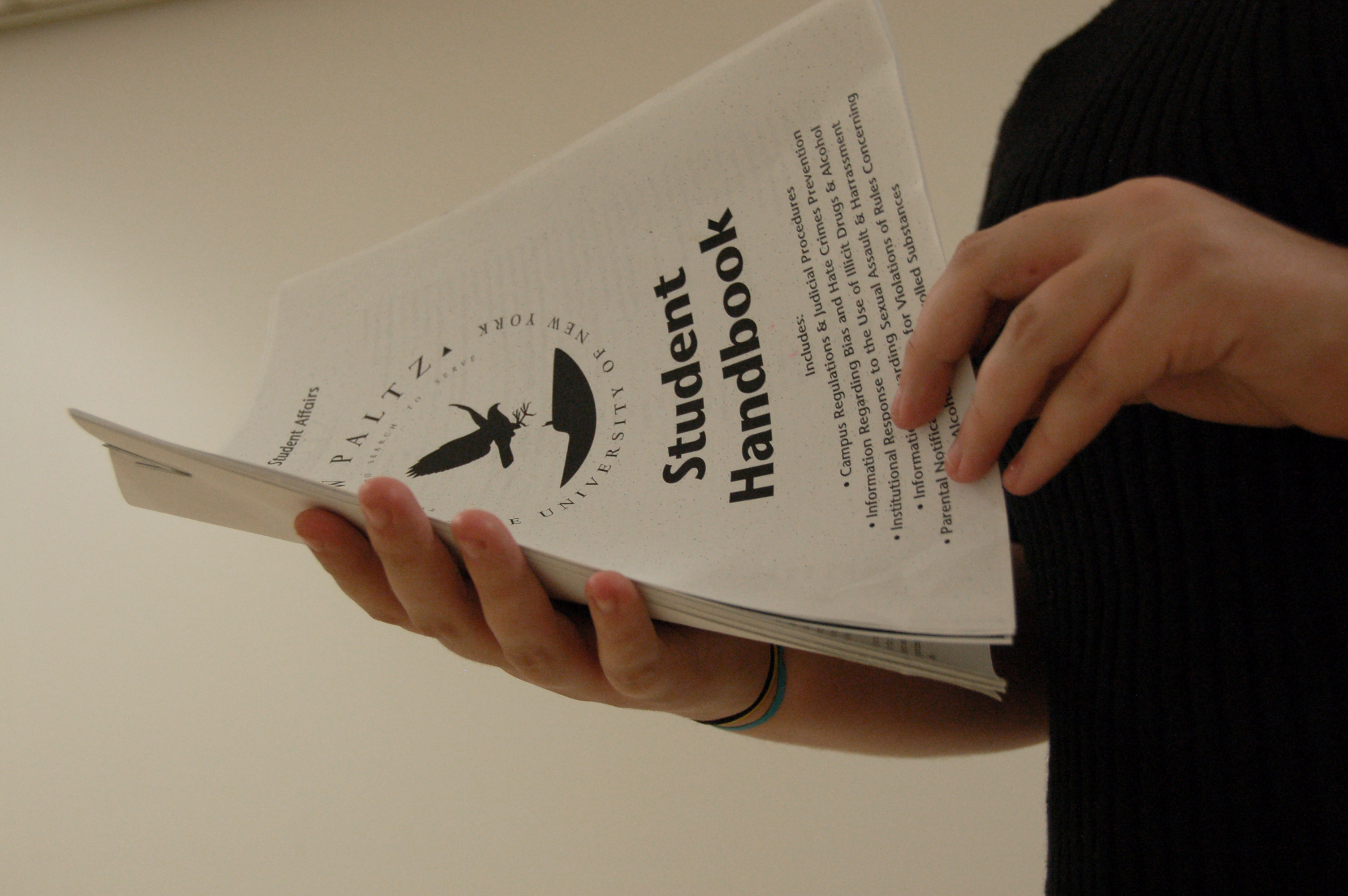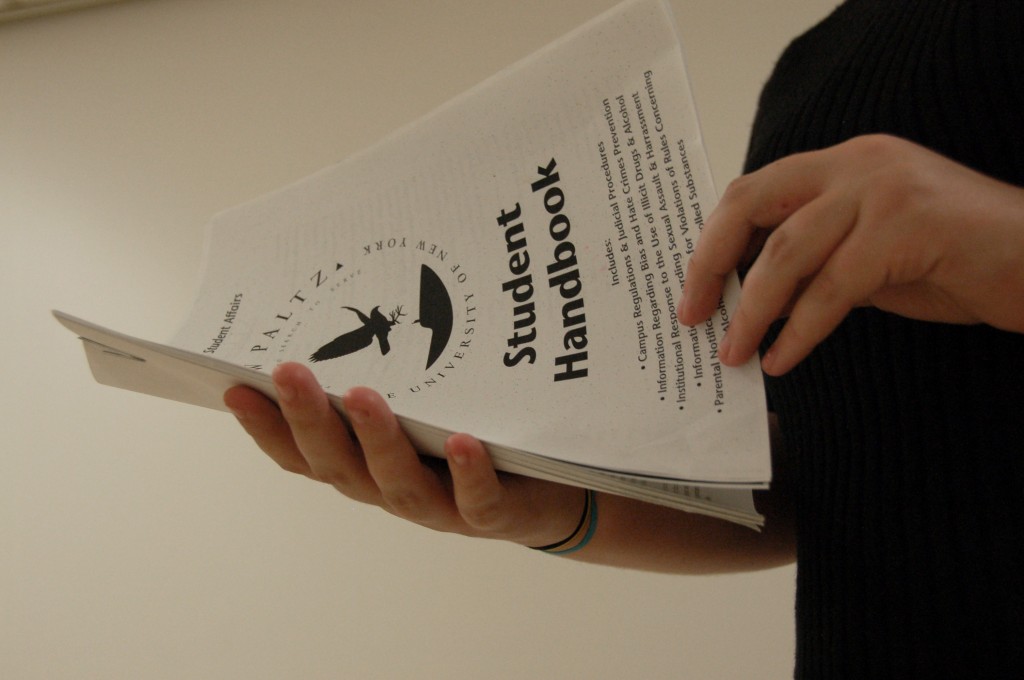

After a mandate from a federal government agency was handed down last spring, the Division of Student Affairs at SUNY New Paltz has adjusted the college’s policies regarding sexual violence as outlined in the student handbook.
The Office of Civil Rights (OCR) issued what is known as a dear colleague letter (DCL) to all colleges and universities in the nation on April 4. Linda Eaton, dean of students, said the document acts as a mandate requiring schools to adjust the way they respond to claims of sexual violence in accordance with Title IX requirements and how they relate to rape, sexual assault, sexual battery and sexual coercion.
The letter was initially sent to President Donald Christian, and SUNY officials later sent messages to campuses across the system to guide college officials in interpreting the letter. Changes to the student handbook were drafted by Eaton and Associate Vice President for Student Affairs Raymond Schwarz with the consultation of legal counsel. These adjustments, Christian said, were approved unanimously by the College Council this month.
“Those entailed very little discussion,” he said. “The changes in the handbook are to update and clarify our policies and practices. In all cases, there were fairly minor changes in language.”
Any changes made to the SUNY New Paltz code to comply with Title IX, the portion of the Education Amendments of 1972 that prohibits discrimination on the basis of sex in any federally funded education program or activity. According to a U.S. Department of Education fact sheet accompanying the DCL, the obligations college officials have under Title IX regarding sexual violence include, but are not limited to, the following:
- taking steps to protect the complainant as necessary, including interim steps taken prior to the final outcome of the investigation
- provide a grievance procedure for students to file complaints of sex discrimination, including complaints of sexual violence that include an equal opportunity for both parties to present witnesses and other evidence and the same appeal rights
- provide grievance procedures that use the “preponderance of the evidence” – a legal standard that is considered to be met if the proposition is more likely to be true than not true – to resolve complaints of sex discrimination
- notify both parties of the outcome of the complaint
Like Christian, Schwarz and Eaton said many of the policy suggestions outlined in the DCL were already in place; however, some were not explicitly detailed in the student handbook and others needed further directions or information added to them to be in compliance with the mandate. Eaton said examples include slight adjustments to the timeline for grievance procedures, ensuring that the filing processes for certain documents like what is known as a retaliation statement is outlined in the handbook rather than simply done.
“Some things were about adding them in writing while other things were sort of tweaking,” she said. “For us, the changes were maybe sort of making sure that these things are not just a practice and are in writing. I think it’s about making it clear in the student handbook and specifically stating things.”
New policies added to the student handbook include allowing a victim of sexual violence to be represented by an attorney in a particular case and a process that would allow a victim to appeal a case as the accused student has been able to do, Eaton said.
Schwarz said the language added to the student handbook about these new and existing policies are what he thinks the OCR was trying to institute across the country: a clear and balanced process for college officials to implement in cases of sexual violence.
“As good as we felt about already doing much of what was in the [DCL], the changes we did implement were along the lines of the spirit of the letter which was increased clarity and equity,” he said. “Those are two pretty good goals.”
Schwarz said that while SUNY New Paltz and other colleges in the system have received mandates from the chancellor about changing student code, he cannot remember a time that such direction was given to the school by a federal agency.
Eaton said the DCL was not taken lightly by those reviewing it this summer, as changes had to be made since the OCR expressed concerns about sexual violence at the collegiate level.
“I think there has always been a lot of coverage in the media in terms of rape and sexual assault on college campuses and college and universities responses to that,” Eaton said. “I think this is the Office of Civil Rights responding to that and hoping that there would probably be some consistency across the board.”
The DCL states that government officials feel that statistics on sexual violence are “both deeply troubling and a call to action for the nation.” The document cites a report from the National Institute of Justice that found that about 1 in 5 women are victims of completed or attempted sexual assault while in college. Additionally, the report shows that approximately 6.1 percent of males were victims of completed or attempted sexual assault during college.
Schwarz said it is important that students review these changes when they are introduced more formally in January, although he and Eaton agreed that students likely aren’t reading the student handbook even though they are technically required to do so. Regardless, Schwarz said the Division of Student Affairs and college officials in general will continue to provide students with guidance in relation to issues of sexual violence, although they sometimes “don’t hear the answers until they ask the questions.”
“Our goal is that when people ask the questions, no matter who they ask them of, they have the answers,” Schwarz said. “There will have to eventually be some education in terms of the code itself but hopefully we were always prepared to make students aware of the resources available to them at the counseling center, the health center, university police and everything else that is available to keep them safe medically, physically and emotionally.”
